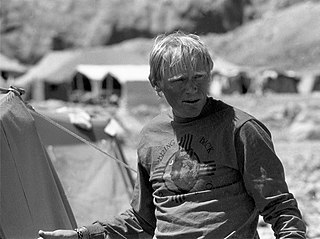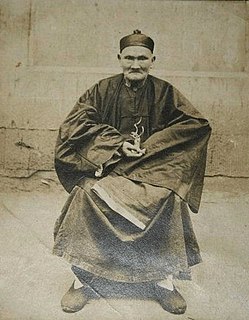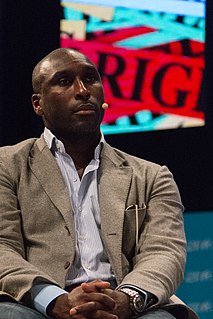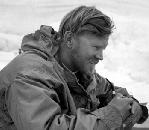A Quote by Anatoli Boukreev
Mountains are cathedrals: grand and pure, the houses of my religion. I go to them as humans go to worship...From their lofty summits, I view my past, dream of the future, and with unusual acuity I am allowed to experience the present moment. My strength renewed, my vision cleared, in the mountains I celebrate creation. On each journey I am reborn.
Related Quotes
Before I had studied Zen for thirty years,
I saw mountains as mountains,
and waters as waters.
When I arrived at a more intimate knowledge, I came to the point where I saw that mountains are not mountains,
and waters are not waters.
But now that I have got its very substance
I am at rest.
For it's just that
I see mountains once again as mountains,
and waters once again as waters.
When you don't flow freely with life in the present moment, it usually means that you're holding on to a past moment. It can be regret, sadness, hurt, fear, guilt, blame, anger, resentment, or sometimes even a desire for revenge. Each one of these states comes from a space of unforgiveness, a refusal to let go and come into the present moment. Only in the present moment can you create your future.
Before practicing meditation, we see that mountains are mountains. When we start to practice, we see that mountains are no longer mountains. After practicing a while, we see that mountains are again mountains. Now the mountains are very free. Our mind is still with the mountains, but it is no longer bound to anything.
In the spiritual world there are no time divisions such as the past, present and future; for they have contracted themselves into a single moment of the present where life quivers in its true sense. The past and the future are both rolled up in this present moment of illumination, and this present moment is not something standing still with all its contents, for it ceaselessly moves on.
We human beings have enormous difficulty in focusing on the present; we always thinking about what we did, about how we could have done it better.... or else we think about the future, about what we're going to do.... But at this precise moment, you also realize that you can change your future by bringing the past into the present. Past and future only exist in our mind. The present moment, though, is outside of time, it's Eternity.... It isn't what you did in the past the will affect the present. It's what you do in the present that will redeem the past and thereby change the future.
The famous Zen parable about the master for whom, before his studies, mountains were only mountains, but during his studies mountains were no longer mountains, and afterward mountains were again mountains could be interpreted as an alleory about [the perpetual paradox that when one is closest to a destination one is also the farthest).
We are seeing, then, that our experience is altogether momentary. From one point of view, each moment is so elusive and so brief that we cannot even think about it before it has gone. From another point of view, this moment is always here, since we know no other moment than the present moment. It is always dying, always becoming past more rapidly than imagination can conceive. Yet at the same time it is always being born, always new, emerging just as rapidly from that complete unknown we call the future. Thinking about it almost makes you breathless.





































